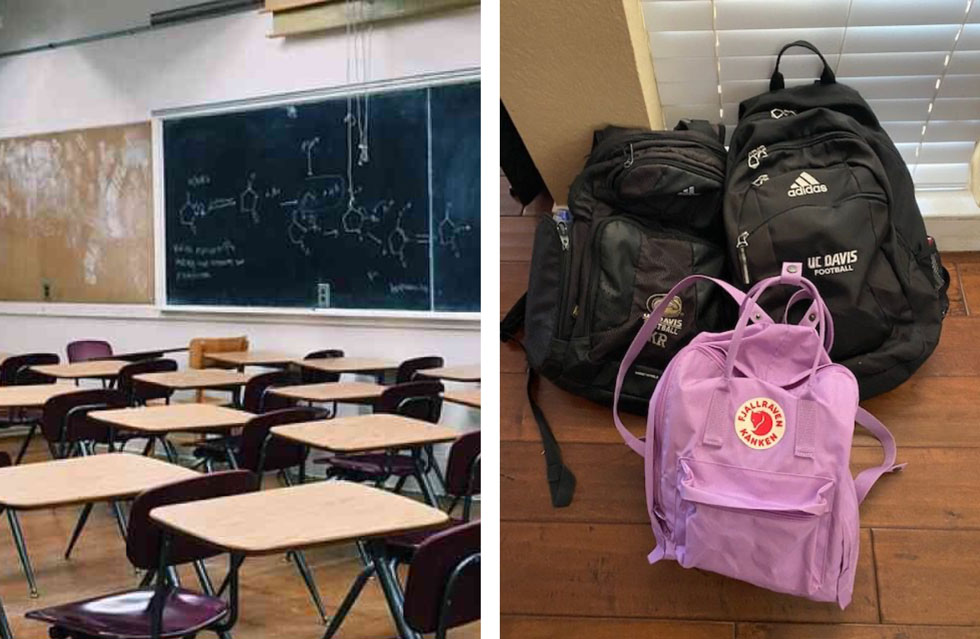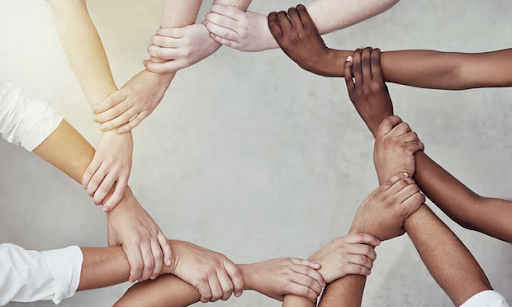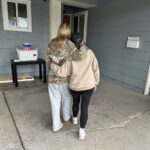My daughter is tired of me. She’s had enough. An almost 16-year-old extrovert is not meant for isolation. She is wired for connection, friendship and community and her family of 5 isn’t cutting it anymore. Her eyes look different…I can see the lonely.
The past 6 weeks have blurred together, and she has done a good job trying to make do with what is happening. Besides keeping up on her schoolwork, she has worked hard to stay busy. She did a puzzle, decorated a cake, tie-dyed shirts, painted, made TikToks, baked cinnamon rolls, rode her bike, cleaned up her catastrophic looking closet (not to my liking but to hers, which is good enough for right now), played catch with her brothers and has gone on countless jogs just to get out of the house. Last week she got out the extra sparklers we buy every 4th of July for something to do at night. The list of creative ways she has occupied her time could go on and on. While it’s wonderful she has dug deep to learn new skills and new ways to pass the time, I know it’s not enough.
She’s more irritable lately, grouchy with us, short fused. Uno games and baking no longer fill the void. Snapchat and Instagram are good, but it they don’t replace face-to-face connections and while she loves her brothers, it’s not the same as sitting in her bedroom on her floor talking to girlfriends. It’s simple: she misses people. I get it, I miss my friends too.
Across the country so many teenagers are struggling with this Age-of-Isolation. It’s foreign and not in their wheelhouse. Teenagers are social creatures, even if it is just with their closest friend or two. Social isolation for humans of all ages is hard; we need social interaction and stimulation to stay healthy. Bonding with peers is one of the essential developmental tasks of teenagers and adolescents. Add to that most teenagers are completely bored at home—Netflix, Google Hangout and video games can only go far.
Of course, there are many teenagers who appear to be thriving in this seclusion, embracing the alone time because they are more introverted personalities. They do not need as much social interaction, not because they don’t value friendships or time with others, but because they need more time alone to recharge and reflect. Introverts often have close, bonded and rich friendships, but just with a smaller circle of people.
Here is where the problem lies. For introverts, school is often the place that nudges them out of their shell. They sit in class with others, say hello to people as they are passing from class to class, and talk with favorite teachers. They might have a band rehearsal, athletic practice or art class that helps them navigate connection with their peers. They sit with people at lunch, and if they chose to sit alone and read a book or sit in the library to do their homework, they are at the very least around classmates, sounds and familiar surroundings.
Times are different right now, especially for our students. Yes, this is difficult and challenging for the extroverts who love to gather, but it is also hard for the introverts, only they might not know it because this is supposed to be their happy place, an excuse to stay home which is what they may have wanted to do in life BC, before Corona. Limited social activity speaks to them and feels like a comfy couch… until it’s your only option.
Recently I was doing a Facetime appointment with one of my high school patients who is an introvert. He has a smaller group of friends and we have worked hard in counseling to say “yes” to things. His instinct to social invitations was always a hard “no”, even though that wasn’t necessarily what he always wanted. He knows he needs relationships but struggles with making them happen. One-on-one he is funny, personable and engaging but get him in a group, his exact words are “I blend into the wall and no one knows I’m even there”.
During our phone session, he mentioned none of his friends from school had reached out to him for three days. Not one person. No one asked how he was doing, what he was doing or how he was handling his days. No classmates checked in on him, lamented on how they were doing or even complained about an assignment in class they had been given. He felt incredibly alone up in his room, even though he had a wonderful and supportive family hanging out downstairs. It felt like he was on an island.
We worked the whole session on empowering him to voice his needs and reach out to others, something so hard for him to do. His old self would have retreated deeper in his shell and in the past, this fueled his depression. As much as he creates his isolation and it is a very safe and comfortable place for him to land, he also knows that he needs interactions with people his own age, and it was usually at school. Sitting with his group of friends for a short lunch period or talking with his teachers was enough contact to make him feel a form of bonding to others and small doses of “people-time” was perfect. With that gone, he is now struggling.
I worry about our teenagers right now- the extroverts, the introverts and the ones in between. No one is safe from the dangers of feeling alone. I worry that they question their value, their existence, their purpose. I worry that those who don’t have someone– a therapist, coach, teacher or parent who they feel safe to talk with– could go deeper in their shell without even knowing what was happening until they find themselves in a very dark place. I worry that good solid parents struggle with meeting the needs of their teenagers who need their peers. I worry that while we know and respect why this is happening, it doesn’t take away from the negative consequences that come with the social and physical distancing.
Research has shown how important human interaction is for health and well-being, regardless of whether a person considers himself or herself an introvert or extrovert – and many people are often a combination of the two. As professionals we know the value on conversations, even with those who don’t talk a lot. As adults, and many of us parents, we need to be aware who even teenagers who are introverts still need care and connection. There is such a thing as too much solitude, and that’s when loneliness happens.
We have no idea how long the situation in which we find ourselves will last. I worry about our teenagers and their mental health and want to be sure they are good in the long haul. I want to be sure we remind them that they are important, noticed and that they matter. I pray they know that even if no one reaches out for a day or two, they have the power to reach out to others and that they know that their voice, their feelings and their presence matters.
For now, I will practice patience with my daughter who misses her peeps. I will offer what I can, an ear for listening, a compassionate heart, and hugs whenever she needs them. I will encourage her to reach out to friends who might be struggling and to look closely for the people who might be “blending into the wall”. I will try to model self-care and be understanding to the fact that I know I am not the person she wants to spend every day with right now. I will give her the space she needs to find creative ways to interact with her friends. I’ll remind myself that social media or screen time is not a bad way for her spend some of her time during the day because this is her way to bridge and socialize with the friends she desperately misses. I’ll check-in with her but also know that her check-ins with her besties matter just as much.
If I am not her favorite person right now, it’s okay. I’ll love on her regardless.
I empathize and I recognize the values of her struggles, they are real.












Thank you for this hugely important reminder, Kelly. ❤️